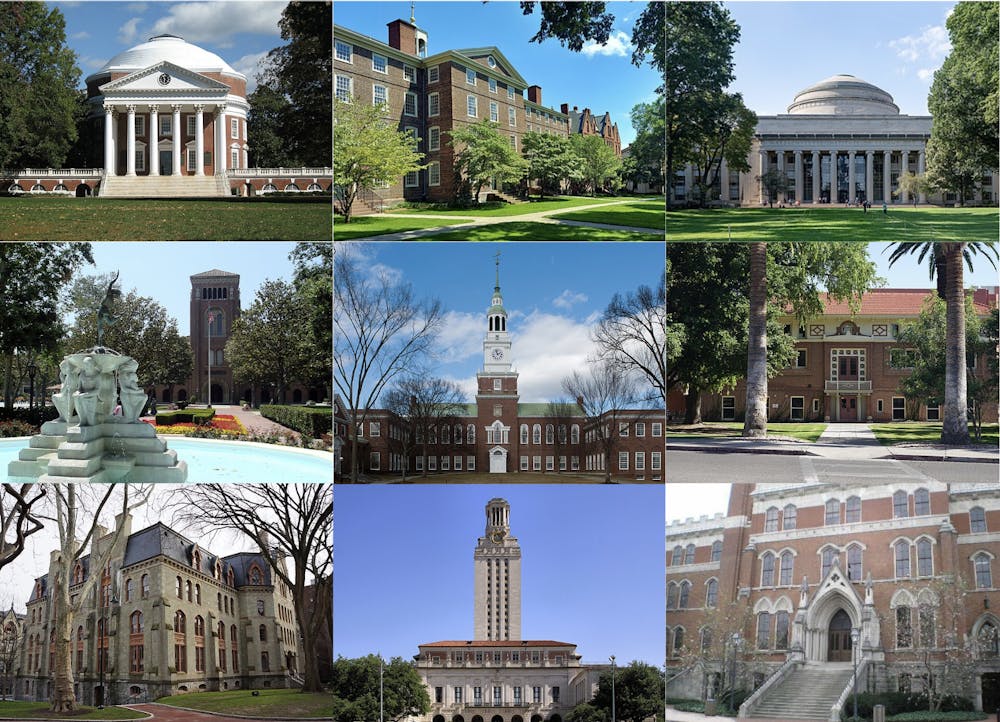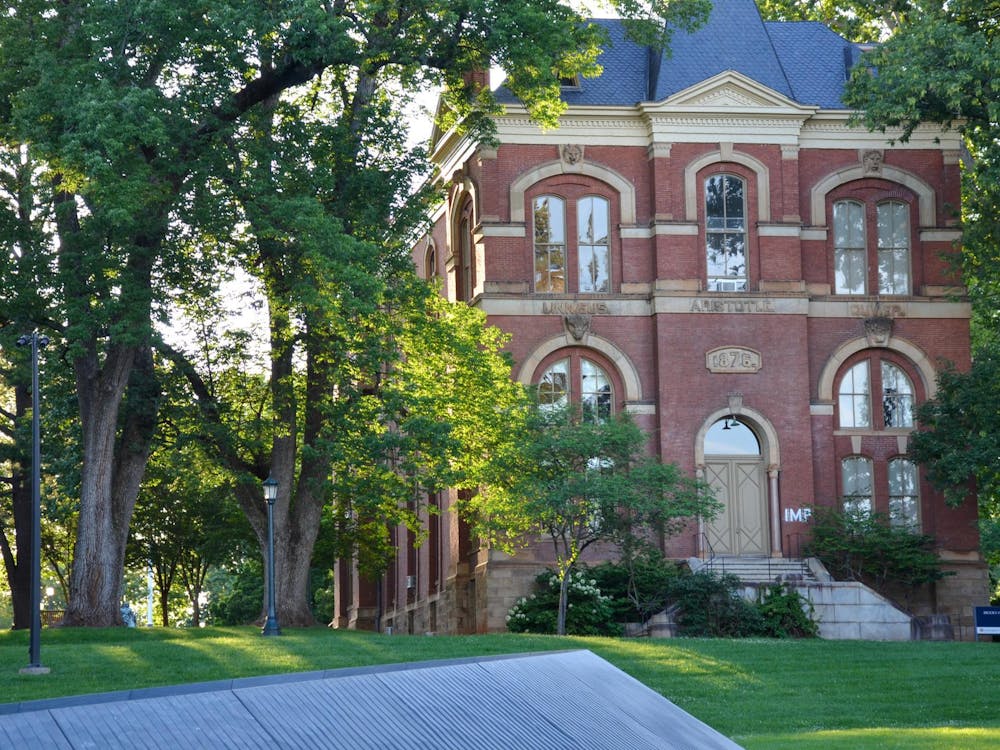Editor’s Note: This piece was originally published Oct. 16 and will be updated as more information becomes available.
The Education Department and senior officials at the White House sent a “Compact for Academic Excellence in Higher Education” to nine universities, including the University of Virginia, Oct. 1.
The Compact was also sent to Brown University, Dartmouth College, Massachusetts Institute of Technology, University of Arizona, University of Pennsylvania, University of Southern California, University of Texas at Austin and Vanderbilt University. Bloomberg confirmed with an anonymous source at the Education Department Oct. 14 that a Truth Social post by President Donald Trump intended to invite all American universities to join the Compact.
“Those Institutions that want to quickly return to the pursuit of Truth and Achievement, they are invited to enter into a forward looking Agreement with the Federal Government to help bring about the Golden Age of Academic Excellence in Higher Education,” Trump wrote.
The Compact outlines a series of values and conditions which universities would have to agree to uphold in return for preferential access to federal funding and partnerships. These conditions include freezing tuition, promoting a “marketplace of ideas,” abolishing institutional units which “punish, belittle, and even spark violence against” conservative ideas and screening international applicants for support of “American and Western values.”
Here is a look at the decisions institutions of higher education have made thus far.
University of Arizona: Rejected Oct. 20
University of Arizona President Suresh Garimella announced that UA would not agree to the terms of the Compact Oct. 20. In a letter to U.S. Education Secretary Linda McMahon, Garimella noted that fair admissions, equal treatment, freedom of expression, civil discourse, and international enrollment are core values that UA upholds. He also wrote that the University does not believe academic freedom is absolute.
“University policies recognize that academic freedom is not absolute, and the University will ensure policies are in place that prohibit discriminatory, threatening, harassing, or other behaviors that infringe on the rights of members of the University community and visitors to the campus,” Garimella wrote.
Garimella emphasized that although UA already follows many of the Compact’s principles, the University does not seek the special treatment or funding that signing the Compact would bring.
“A federal research funding system based on anything other than merit would weaken the world’s preeminent engine for innovation, advancement of technology, and solutions to many of our nation’s most profound challenges,” Garimella wrote. “We seek no special treatment and believe in our ability to compete for federally funded research strictly on merit.” — Lucia Gambacini, News Senior Writer
Dartmouth College: Rejected Oct. 18
Dartmouth President Sian Leah Beilock announced the College’s formal rejection of the Compact Oct. 18. In an email to the Dartmouth community, Beilock cited the preservation of the College's academic freedom as a reason for the rejection.
“I do not believe that a compact — with any administration — is the right approach to achieve academic excellence, as it would compromise our academic freedom, our ability to govern ourselves, and the principle that federal research funds should be awarded to the best, most promising ideas,” Beilock wrote.
Beilock went on to note that she had mentioned Dartmouth’s reasons for not agreeing to the Compact during a phone call with the White House on Friday. She added that Dartmouth is open to collaborating with the federal government through other means.
“I welcome further engagement around how we can (a) enhance the long-standing partnership between the federal government and this country’s leading research universities and (b) ensure that higher education stays focused on academic excellence,” Beilock wrote. — Lucia Gambacini, News Senior Writer
University of Virginia: Rejected Oct. 17
The University rejected the Compact for Academic Excellence in Higher Education Oct. 17, according to a community statement released Friday evening by Interim University President Paul Mahoney.
In his email, Mahoney shared the letter which he sent to the Department of Education Friday, in which he said that the University does not wish to receive any preferential treatment for federal funding.
“We seek no special treatment in exchange for our pursuit of those foundational goals. The integrity of science and other academic work requires merit-based assessment of research and scholarship,” Mahoney wrote. “A contractual arrangement predicating assessment on anything other than merit will undermine the integrity of vital, sometimes lifesaving, research and further erode confidence in American higher education.”
Mahoney did not say that he has definitively rejected the Compact and suggested that he looks forward to future collaboration with the federal government.
“Higher education faces significant challenges and has not always lived up to its highest ideals. We believe that the best path toward real and durable progress lies in an open and collaborative conversation,” Mahoney wrote. “We look forward to working together to develop alternative, lasting approaches to improving higher education.” — Cecilia Mould, News Editor
University of Southern California: Rejected Oct. 16
Interim President Beong-Soo Kim announced the University of Southern California's formal rejection of the Compact Oct.16. In a release to the broader community, Kim shared the letter he sent to the Department of Education. He noted that while his institution’s current values align with many of the Compact’s ideas — including promoting a variety of ideas and preventing discrimination in admissions — elements about research funding were the main reason he chose to decline the invitation.
“Notwithstanding these areas of alignment, we are concerned that even though the Compact would be voluntary, tying research benefits to it would, over time, undermine the same values of free inquiry and academic excellence that the Compact seeks to promote,” Kim wrote.
In his letter, the interim president also said that linking funding access to adherence with a set of outlined values could have negative effects on the merit of research projects.
“Other countries whose governments lack America’s commitment to freedom and democracy have shown how academic excellence can suffer when shifting external priorities tilt the research playing field away from free, meritocratic competition,” Kim wrote. — Cecilia Mould, News Editor
University of Pennsylvania: Rejected Oct. 16
University of Pennsylvania President Larry Jameson announced Oct. 16 that he will not sign the Compact. The decision made the University of Pennsylvania the third institution — following M.I.T. and Brown — to formally decline the proposal. Jameson announced Oct. 5 that he was reviewing the contract with input from the Penn community, including deans, the Faculty Senate, and the Board of Trustees.
In a message to his community, Jameson said he had informed the Department of Education regarding the decision alongside formal feedback outlining areas of agreement as well as “substantive concerns,” over the compact’s requests. — Lucia Gambacini, News Senior Writer
Brown University: Rejected Oct. 15
In a letter to the White House sent Oct. 15, Brown University President Christina Paxson said she agreed with the idea of maintaining a strong relationship between the federal government and institutions of higher education, but that the university could not join the Compact.
“I am concerned that the Compact by its nature and by various provisions would restrict academic freedom and undermine the autonomy of Brown’s governance, critically compromising our ability to fulfill our mission,” Paxson wrote.
The president also mentioned Brown’s existing, voluntary agreement with the federal government, signed July 30, which closed investigations into shared ancestry and race discrimination and restored Brown’s research funding. She noted that the university will continue to adhere to that agreement, but felt that the Compact did not sufficiently protect academic freedom.
“Brown’s existing agreement with the federal government expressly affirms the government’s lack of authority to dictate our curriculum or the content of academic speech — a principle that is not reflected in the Compact,” Paxson wrote. — Cecilia Mould, News Editor
Massachusetts Institute of Technology: Rejected Oct. 10
The Massachusetts Institute of Technology became the first university to reject the Compact Oct. 10, when President Sally Kornbluth shared her response to the Education Department with the community. She highlighted the institution’s core values, which include a commitment to rewarding merit, financial accessibility and free expression, and said that MIT already meets or exceeds many of the conditions laid out in the Compact.
However, Kornbluth wrote, the Compact also includes principles that MIT disagrees with.
“Fundamentally, the premise of the document is inconsistent with our core belief that scientific funding should be based on scientific merit alone,” Kornbluth wrote. “In our view, America’s leadership in science and innovation depends on independent thinking and open competition for excellence. In that free marketplace of ideas, the people of MIT gladly compete with the very best, without preferences.” — Cecilia Mould, News Editor







